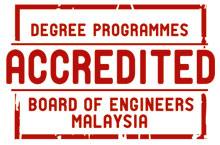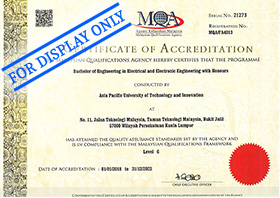You are here
Bachelor of Electrical and Electronic Engineering with Honours

|
|
|
APU-DMU DUAL DEGREE PROGRAMME
|
INTERNATIONAL RECOGNITION - ENGINEERING DEGREES ACCREDITED UNDER THE WASHINGTON ACCORD
APU Engineering Degrees are fully accredited by the Board of Engineers Malaysia (BEM) which is a signatory to the Washington Accord.
For more information, please click HERE. |   |
ADMISSION REQUIREMENTS
| GENERAL REQUIREMENTS | |
| DIRECT ENTRY TO LEVEL 1 OF THE DEGREE: | |
| STPM | • 2 Passes in STPM with a minimum Grade C (GP 2.0) in Mathematics and Physics (or Chemistry), and a Credit in Mathematics and Physics (or Chemistry) at SPM Level or its equivalent. |
| A-LEVEL | • 2 Passes (Grade A-D) in A-Level including Mathematics and Physics (or Chemistry). |
| UEC | • 5 Grade B’s in UEC, including Mathematics and Physics (or Chemistry). |
| MATRICULATION/ FOUNDATION | • Passed the relevant Foundation programme (minimum CGPA of 2.0) with a Credit in Mathematics and Physics (or Chemistry) at SPM/O-Level/IGCSE or equivalent. |
| ENTRY TO LEVEL 2 OF THE DEGREE: | |
| DIPLOMA | • Successful completion of the APU/APIIT Engineering Diploma and fulfilment of requirements for Credit Transfer, subject to the approval of the APU Academic Board OR • Successful completion of Diploma in Engineering with other recognised Institutions and fulfilment of requirements for Credit Transfer, subject to the approval of the APU Academic Board. |
Any qualification that APU accepts as equivalent to the above.
Candidates who wish to study Engineering Degree course must not be color blind or physically handicapped which makes him/her unable to conduct experimental/practical work and affect the learning process leading to potential errors towards professional practice as well. This is in line with the requirements of engineering professional bodies where safe engineering practices is mandatory. All International Students need to go through EMGS Medical Screening, if the student is found to be color blind; the Medical Screening maybe failed.
| ENGLISH REQUIREMENTS | |
INTERNATIONAL STUDENTS | • IELTS : 5.0 |
PROGRAMME EDUCATIONAL OBJECTIVES
- Be a practicing engineer contributing to the development of Electrical or Electronic Engineering while demonstrating professionalism.
- Pursue engineering innovation via career advancement opportunities and/or advanced studies in Electrical or Electronic Engineering.
An Electrical or Electronic Engineer maybe responsible for research, design, development, manufacturing and management of complex hardware and software systems and reliable, cost effective devices, many involving the use of new information and computer intensive technologies. These include:
|
|
PROGRAMME LEARNING OUTCOMES
The students, upon completion of their study, should attain the following outcomes:
| PLO1 | Ability to gain and apply principles of Mathematics, Science and Engineering to the solutions of complex engineering problems. |
PLO2 | Ability to undertake complex engineering problem analysis and apply engineering principles to solve them. |
PLO3 | Ability to design innovative solutions for complex engineering problems. |
| PLO4 | Ability to investigate complex engineering problems using research techniques. |
| PLO5 | Ability to select and use suitable tools and techniques for complex engineering problems. |
| PLO6 | Ability to engage in professional engineering practice for safety, health, social, cultural and legal responsibilities in developing solutions for complex engineering problems. |
| PLO7 | Ability to comprehend and demonstrate good practices of engineering in sustainable development and environmental considerations for the solutions of complex engineering problems. |
| PLO8 | Ability to execute the responsibilities of an Engineer professionally and ethically. |
| PLO9 | Ability to function effectively as a team leader or a member in a team within multi-disciplinary settings. |
| PLO10 | Ability to communicate effectively and professionally on complex engineering activities. |
| PLO11 | Ability to demonstrate entrepreneurship skills, engineering project management and economic decision making in multidisciplinary environments. |
| PLO12 | Ability to recognise the need for, and be able to engage in independent and life-long learning towards continuous professional development. |
PROGRAMME OUTLINE
This programme is specifically designed to provide students with:
- High-quality undergraduate engineering education by providing students with a curriculum that is firmly grounded in electrical & electronic engineering fundamentals.
- A study in both the areas of electronics fundamentals as well as electrical power systems including the areas of generation, transmission and distribution of electrical energy.
DEGREE YEAR 1 |
Students will understand the basic principles of engineering in the areas of Circuit Analysis, Engineering Materials and Engineering Design. Other modules aim to provide the basic academic skills required to meet the demands of employers, as well as thorough grounding in principles of IT and entrepreneurship. Important and relevant skills for managing activities and for their own independent learning are also introduced.
COMMON MODULES | |
|
|
DEGREE YEAR 2 |
Here, students start specialising in modules that develop the necessary underlying knowledge and skills in Electrical & Electronic Engineering with modules such as Analogue Electronics, Digital Electronics, Electromagnetic Field Theory, Engineering Software & Applications and Signals and Linear Systems. Engineering Mathematics is provided for the better understanding of the engineering modules.
COMMON MODULES | |
|
|
SPECIALISED MODULES | |
|
|
DEGREE YEAR 3 |
Specialised knowledge and skills in the areas of Control Engineering, Machine Vision & Intelligence, Communication Engineering Principles, Microprocessor Systems & Embedded Software, Digital Signal Processing, Generation, Transmission and Distribution of Electrical Power, and Power Electronics & Drives are the critical focus of this level. There is further development of the ability to apply relevant engineering skills with strong critical thinking and analysis. Independent learning continues in all modules.
COMMON MODULES | |
|
|
SPECIALISED MODULES | |
|
|
IN THE 2ND SEMESTER OF YEAR 3 MINOR/EXTENSION PATHWAY (CHOOSE 1) | |
| |
INTERNSHIP (16 WEEKS) |
Students will undertake an Internship/Industrial Training for a minimum period of 16 weeks to prepare them for a smooth transition from the classroom to the working environment.
DEGREE YEAR 4 |
The final year Engineering modules provide the necessary industry application and technological skills which become very useful for employment upon graduation. Students’ personal and professional development, technical capability and understanding of how to innovate, generate and manage the creation of new ideas will be enhanced. Students will deliver several Engineering Projects where they will demonstrate higher level critical thinking, analysis and solutions development skills which will enhance their employability.
COMMON MODULES | |
|
|
SPECIALISED MODULES | |
|
|
MINOR/EXTENSION PATHWAY (CONTINUATION) | |
| |
ELECTRICAL & ELECTRONIC ENGINEERING MINOR/EXTENSION PATHWAYS
Future Proof Engineers for the Real World
In APU, employment and it’s continual sustainability is of paramount importance to us. The range of minor and extensions offered to all students within the School of Engineering will craft a formidable way forward for the young aspiring engineers of tomorrow. These options allow students to embark on a journey of exploration either within the engineering fraternity by extending into greater depth (extensions) niche knowledge, skills and attributes required for the practice of contemporary engineering or explore wider options (minor) that are pivotal in the fundamental proliferation of the engineering profession as a while when coupled with other current multidisciplinary fields of expertise. Successful completion of either pathways future proof the students allowing them to embark on a journey of rewarding careers within an engineering discipline of their choice.
Minor Pathway – Gain breadth of knowledge by taking 3 set modules outside of a particular major field of study. There are minor packages available undertaken from Year 3 Semester 2 Year 4 Semester 1 and Year 4 Semester 2.
MINOR PATHWAY | ||||
NAME OF MINOR | Year 3 Semester 2 | Year 4 Semester 1 | Year 4 Semester 2 | |
loT | Knowledge Discovery and Big Data Analytics | Internet of Things: | Emergent Technology | |
FinTech | FinTech Governance, Risk Management & Compliance | Digital Finance | Robo Advisor | |
Digital Transformation | Digital Execution | Digital Strategy & Analytics | Emergent Technology | |
Data Analytics | Knowledge Discovery and Big Data Analytics | Behavioral Science and | Optimization & Deep | |
Artificial Intelligence | Machine Vision Intelligence | Text Analysis & Sentiment | Emergent Technology | |
Digital Age Psychology | Industrial & Organizational | Cyberpsychology | Human Factors | |
Extension Pathway – Expand depth of knowledge by taking three (3) set modules in a specific area within a certain field of study. There are extensions available undertaken from Year 3 Semester 2, Year 4 Semester 1 and Year 4 Semester 2.
EXTENSION PATHWAY | ||||
NAME OF EXTENSION | Year 3 Semester 2 | Year 4 Semester 1 | Year 4 Semester 2 | |
Smart Drones | Robotic Technology | Robot Operating Systems | Drone Technology | |
Smart Manufacturing | Robotic Technology | Robot Operating Systems | Product Creation Technology | |
Drilling Technology | Drilling Fluids & Hydraulics | Directional Drilling & Surveying | Well Control | |
Intelligent Design and Manufacturing Technologies | Machine Vision Intelligence | CAD/CAM | Product Creation Technology | |
Oil and Gas Operations | Gas Engineering | Petroleum Economics | Drilling Fluids & Hydraulics | |
MQA COMPULSORY SUBJECTS* |
|
|
(*All students are required to successfully complete these modules as stipulated by the Malaysian Qualification Agency.) | |
CAREER OPTIONS
From geographical information systems that can continuously provide the location of a vehicle to giant electric power generators, electrical and electronics engineers are responsible for a wide range of technologies. A degree in Electrical & Electronics Engineering offers challenging opportunities over a wide range of activities from research and design to operations, management and planning. Career choices are in diverse areas such as Power Systems, Electrical equipment manufacturing and testing, Biomedical Engineering and Computer Systems Engineering and also as technical experts on engineering projects in the Banking and Finance Industry.
|
|
COURSE FEES
Malaysian Students | International Students |
Year 1: RM 28,200 | Year 1: RM 31,600 (USD 7,350) |
* Fees stated here do not include Deposits and other Miscellaneous Fees. Please refer to Fee Guide for details.
MQA ACCREDITATION
(R3/0712/6/0015)(02/29)(MQA/FA4013) |
| All information is correct at the time of publication, but is subject to change in the interest of continuing improvement. |
Engineering Degree Programmes |



